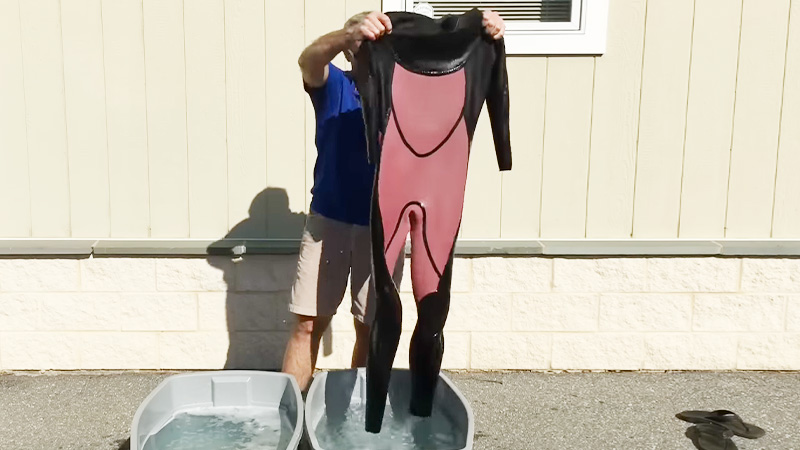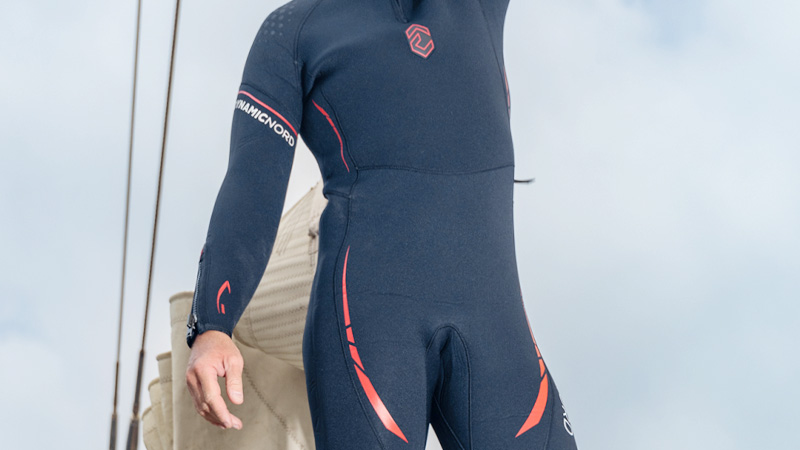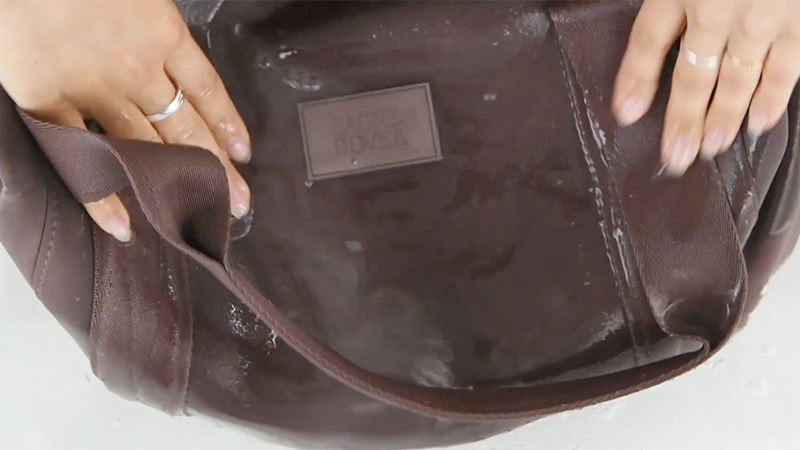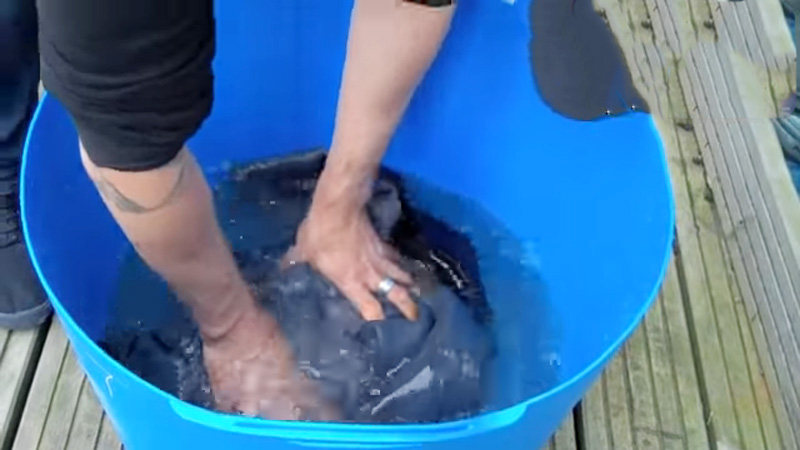Neoprene, a versatile and durable material known for its use in wetsuits, athletic gear, and various accessories, demands specialized care to maintain its performance and appearance.
Whether you’re an avid surfer or athlete or simply own neoprene items, knowing how to wash neoprene properly is essential to ensure its longevity. Neoprene’s unique composition requires a gentle touch, as it can be sensitive to certain cleaning methods and chemicals.
In this guide, we will explore the best practices for washing neoprene, from choosing the right cleaning agents to avoiding common mistakes that could compromise its integrity. These techniques not only remove dirt, salt, and odors but also help extend the life of your neoprene gear.
So, whether you’re preparing to clean your wetsuit after a surf session or maintaining your favorite neoprene accessories, let’s delve into how to wash neoprene.

How To Wash Neoprene?
Here are the simple methods to wash neoprene:
Hand Wash With Mild Detergent
To hand wash neoprene, fill a large bowl or sink with lukewarm water and add a small amount of mild detergent. Submerge the item in the water and use a soft brush or sponge to gently clean the neoprene.
Rinse the item thoroughly with clean water and squeeze out excess water. Do not wring or twist the neoprene as this can damage it.
Machine Wash With Neoprene Cleaner
To machine wash neoprene, you can use a specialized neoprene cleaner or a mild laundry detergent. Turn the item inside out and place it in a mesh laundry bag. Use a gentle cycle and cold water. Do not use bleach, fabric softener, or dryer sheets. Hang the item to dry in a well-ventilated area.
Soak In Vinegar Solution
To soak neoprene in a vinegar solution, you can use white vinegar or apple cider vinegar. Mix one part vinegar with four parts water in a large tub or container. Submerge the item in the solution and let it soak for an hour or more.
This can help remove odors and stains from the neoprene. Rinse the item well with clean water and hang it to dry.
Spray With Rubbing Alcohol
To spray neoprene with rubbing alcohol, you can use a spray bottle or a cloth soaked in rubbing alcohol. Spray or wipe the neoprene with rubbing alcohol, focusing on the areas that are dirty or smelly.
Rubbing alcohol can help disinfect and deodorize the neoprene. Let the item air dry completely before using it again.
Steam Clean With Iron
To steam-clean neoprene with iron, you can use a steam iron or a garment steamer. Turn the item inside out and lay it flat on an ironing board or a towel. Set the iron to low heat and steam mode, or use the steamer according to the instructions.
Gently glide the iron or steamer over the neoprene, avoiding direct contact with the fabric. Steam cleaning can help remove wrinkles and refresh the neoprene.
Freeze Overnight
To freeze neoprene overnight, you can use a freezer bag or a plastic wrap. Place the item in the freezer bag or wrap it with plastic wrap, making sure to seal it well. Put the item in the freezer and leave it overnight.
Freezing can help kill bacteria and eliminate odors from the neoprene. Thaw the item at room temperature and hang it to dry.
Dry Clean Professionally
To dry clean neoprene professionally, you can take it to a dry cleaner that specializes in neoprene or synthetic fabrics. Dry cleaning can help remove stubborn stains and dirt from the neoprene without damaging it.
However, dry cleaning can be expensive and may not be necessary for regular maintenance of neoprene.
These are some of the methods you can try to wash neoprene easily at home or professionally.
Materials Needed To Wash Neoprene?

To wash neoprene, you will need the following materials:
Mild Detergent
Mild detergent is a gentle and non-abrasive cleaning agent that can remove dirt and stains from neoprene without harming it. You can use any mild detergent that is suitable for synthetic fabrics, such as woolite or baby shampoo.
Neoprene Cleaner
Neoprene cleaner is a specialized cleaning product that is designed for neoprene and other synthetic fabrics. It can help remove odors, bacteria, and salt from neoprene without affecting its elasticity or durability. You can buy neoprene cleaner from any sporting goods store or online.
Vinegar
Vinegar is a natural and eco-friendly cleaning agent that can help remove odors and stains from neoprene. It can also restore the pH balance of neoprene and prevent it from deteriorating. You can use white vinegar or apple cider vinegar for this purpose.
Rubbing Alcohol
Rubbing alcohol is a common household item that can also help clean neoprene. It can help disinfect and deodorize neoprene, as well as remove grease and oil from it. You can use any rubbing alcohol that has at least 70% alcohol content for this purpose.
Steam Iron Or Garment Steamer
Steam iron or garment steamer is a device that uses hot steam to smooth out wrinkles and creases from fabrics. It can also help refresh and sanitize neoprene, as well as remove dust and lint from it.
You can use any steam iron or garment steamer that has a low heat setting and a steam mode for this purpose.
Freezer Bag Or Plastic Wrap
A freezer bag or plastic wrap is a material that can help preserve food in the freezer. It can also help clean neoprene by freezing it overnight.
Freezing can help kill bacteria and eliminate odors from neoprene, as well as make it easier to remove dirt and stains from it. You can use any freezer bag or plastic wrap that is large enough to fit your neoprene item for this purpose.
Dry Cleaner
Dry Cleaner is a professional service that can help clean neoprene by using special solvents and machines. Dry cleaning can help remove stubborn stains and dirt from neoprene without damaging it.
However, dry cleaning can be expensive and may not be necessary for regular maintenance of neoprene.
What Is The Best Thing To Clean Neoprene With?

Cleaning neoprene requires gentle yet effective methods to preserve its quality and longevity. Here are the suitable items to clean neoprene effectively:
Mild Soap And Water
A mild, pH-balanced soap and lukewarm water are among the best choices for cleaning neoprene. Mix the soap with water to create a gentle cleaning solution that won’t damage the fabric.
Neoprene-Specific Cleaner
Specialized neoprene cleaners are formulated to clean neoprene effectively without compromising its integrity. They are readily available and designed for this specific purpose.
Vinegar And Water
A solution of water and white vinegar (1:4 ratio) can help remove odors and disinfect neoprene. This mixture is especially useful for eliminating bacteria and mildew smells.
Baking Soda Paste
Make a paste by mixing baking soda with water, then gently rub it onto stained areas. Rinse thoroughly afterward to prevent residue buildup.
Isopropyl Alcohol
Isopropyl alcohol can effectively remove oils, greases, and stubborn stains from neoprene surfaces. Apply it sparingly using a soft cloth or sponge and rinse well.
Soft Brush Or Sponge
A soft-bristle brush or sponge is essential for gentle scrubbing and dislodging dirt from neoprene surfaces without causing damage. Avoid abrasive materials that may scratch the fabric.
Microfiber Towels
Microfiber towels are ideal for drying neoprene after cleaning. They are absorbent and won’t leave lint or residue behind, ensuring a clean, dry surface.
Always test your chosen cleaning method on a small, inconspicuous area of the neoprene item to ensure it doesn’t cause discoloration or damage.
After cleaning, rinse thoroughly with clean water and allow the neoprene to air dry naturally, avoiding exposure to direct sunlight or heat sources, which can damage the material. Proper care and the right cleaning materials will help you maintain the quality and appearance of your neoprene items.
Mistakes To Avoid When Washing Neoprene?

Washing neoprene, a specialized and sensitive material, requires care to maintain its durability and flexibility. To prevent damage and ensure the longevity of your neoprene items, here are the common mistakes to avoid:
Using Harsh Chemicals
One of the most significant mistakes is using harsh chemicals like bleach or solvents. These can break down neoprene and cause it to lose its elasticity and strength. Stick to mild cleaning solutions specifically designed for neoprene.
Hot Water And Heat Exposure
Avoid washing neoprene in hot water or exposing it to high-heat sources, such as tumble drying or direct sunlight. Heat can distort the material, leading to warping, shrinking, or cracking.
Machine Washing And Agitatio
Machine washing and the accompanying agitation can cause neoprene items to rub against each other or other garments, potentially causing tears or abrasions. Hand washing is the preferred method to minimize the risk of damage.
Neglecting To Rinse Thoroughly
Failing to rinse neoprene items thoroughly after cleaning can leave behind residue from cleaning agents. This residue may not only compromise the material but also lead to skin irritation when worn.
Wringing Or Twisting When Wet
Neoprene is most vulnerable when wet. Avoid wringing or twisting neoprene items when trying to remove excess water, as this can damage the fabric and affect its shape.
Not Checking For Sharp Objects
Before washing neoprene items, inspect them for any sharp objects like shells, rocks, or hooks that may have become embedded. These can tear or puncture the neoprene during the washing process.
Using Excessive Force When Scrubbing
When scrubbing neoprene to remove stains or odors, use a gentle touch. Excessive force can wear down the fabric and reduce its longevity.
By avoiding these common mistakes and adhering to proper care techniques, you can extend the life of your neoprene items and keep them in excellent condition for years to come.
FAQs
Can I machine wash neoprene items like wetsuits or knee sleeves?
Machine washing neoprene items is generally not recommended. The agitation and spinning in a washing machine can cause the neoprene to rub against itself or other items, potentially leading to tears or damage.
Hand washing is the safer option, allowing for more delicate handling and control over the cleaning process.
Can I use regular laundry detergent to wash neoprene?
Using regular laundry detergent is not advisable, as it can contain harsh chemicals that may harm neoprene. Instead, opt for a mild, pH-balanced soap or a specialized neoprene cleaner.
These are designed to clean neoprene effectively without compromising its integrity.
How should I dry neoprene items after washing them?
To prevent damage, avoid using high-heat sources like tumble dryers or direct sunlight. Instead, hang neoprene items in a well-ventilated area and allow them to air dry naturally. Ensure they are fully dry before storing to prevent the growth of mold or mildew.
Can I remove odors from neoprene?
Yes, you can remove odors from neoprene by washing it with a solution of water and white vinegar (1:4 ratio). The vinegar helps disinfect and eliminate bacteria causing the odor. After washing, rinse thoroughly with fresh water and allow the neoprene to air dry.
Can I scrub neoprene vigorously to remove stubborn stains?
It’s best to avoid vigorous scrubbing, as it can damage the neoprene. Instead, apply a gentle touch when cleaning. For stubborn stains, consider using a paste made of baking soda and water or a neoprene-specific cleaner. Allow the cleaning agent to sit for a few minutes before rinsing thoroughly.
Conclusion
Mastering the art of washing neoprene is a vital skill for anyone who values their neoprene gear’s performance and longevity. Neoprene’s unique properties make it both flexible and durable, but it also requires specialized care to remain in optimal condition.
By following the recommended cleaning methods, such as using mild soap and water, avoiding harsh chemicals, and steering clear of heat exposure, you can ensure that your neoprene items stay clean, fresh, and free from damage.
Remember to inspect your gear regularly for any signs of wear or embedded objects, and always rinse thoroughly to remove cleaning agents.
With these techniques in mind, you can confidently clean and maintain your neoprene gear, whether it’s a wetsuit for your next water adventure or accessories that enhance your active lifestyle. Proper care ensures that your neoprene items will continue to serve you well for years to come.
Leave a Reply